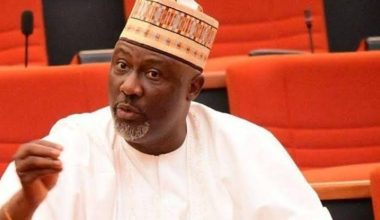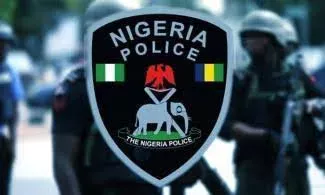By Ralph Omololu Agbana
It is no news that President Muhammadu Buhari played host to state governors at his personal residence in Daura, Katsina State, during the Sallah break, including Yahaya Bello of Kogi State, who had his Chief of Staff, Jamiu Abdulkareem Asuku among his entourage.
During the visit, it was alleged that Bello introduced Asuku to the President, fueling speculations that the visit was about 2023.
As expected, online media feasted on the visit and splashed photographs of Bello, Asuku in conviviality with the President.
However, Kogi State Commissioner for Information and Communications, Kingsley Fanwo, told The Guardian that the visit was not political but to celebrate with the President.
He said, “It is a mere visit. They (online media) make issues out of nothing. There is nothing political about it, a son went to visit his father with his team”.
While Asuku’s “introduction” by his boss may not be politically motivated, the news hit the streets of Lokoja, Kogi State capital and environs that parley with Buhari had gone beyond visitation etiquette.
The reason is not far-fetched, as it was said that the governor was considering loyalty and competence in the choice of a successor and lately Asuku appears to meet the governor’s requirement.
Until now, the race for succession in the 1901 Lugard House, Lokoja, was said to be foggy. Not even the election bookies would like to put their money on who is the likely successor or which of the three senatorial districts would produce the next governor. In the least, bookmakers could hazard a guess that since the incumbent hails from Kogi Central, after two his terms, a politician from East or West should pick the baton.
Besides, there was alleged “agreement” that Governor Bello would handover to his Deputy and bosom friend, Edward Onoja at the completion of his tenure. Bello and Onoja are friends predating the 2015 election and both were said to have plotted Bello’s election strategy. Onoja is of the majority Igala tribe, Kogi East.
Onoja in 2016 emerged as the powerful Chief of Staff to Bello. He wielded so much power within the Bello administration and ruling APC, earning him the accolade of a de-facto governor. During Bello’s second term election, Onoja who was elevated from the Chief of Staff to become deputy governorship candidate ran on a joint ticket with Bello. He had reputation for leading deployment of incumbency onslaught that ensured that the usual and much expected bloc votes from the majority Kogi East zone, which fielded fellow Igala, Engr Musa Wada, candidate of Peoples Democratic Party (PDP), did not materialise. Untill now, all eyes were on Onoja as likely successor to Bello, as compensation for his loyalty.
Beyond the argument that only West is yet to produce governor, the performance/contribution of the zone to Bello’s second term election, and the fact that as fellow minorities, the Yoruba/Lokoja/Kotonkarfe (Kogi West) would not stand a better chance than now, under Bello, an Ebira remains a moot point. This position was further buttressed by results that gave victory to APC in the 2019 governorship election, showing Kogi East lagging behind central and west senatorial districts in number of votes cast for Bello. The result from East was not unexpected because Bello’s main opponent came from that zone.
Kogi East has about 50 per cent of population of the state, based on 2006 population census and that explains why the zone has produced all elected governors across party lines until November 2015 poll when death snatched the mandate from Prince Abubakar Audu, candidate of APC while already coasting to victory. The “divine” lot of replacing the fallen candidate then fell on Yahaya Bello, runner up in APC primaries, paving way for the first governor of Kogi State coming from a minority ethnic group, Ebira.
Bello’s first term was seen as accidental, and a misnomer, he was not given a chance to last for more than one term in office.
A second term for Bello was widely believed to be impossible in a real contest between a candidate of Igala extraction and candidate from either Kogi Central or West. Hence, PDP had perfected its game plan to bring its candidate from the East.
Engr Musa Wada, brother to former Governor Idris Wada from the East emerged as candidate of PDP, but this did not happen until final hours to the general election due to the keenly contested, primaries and consequent litigations that dotted the campaign strategies of opposition party.
Against predictions, Bello won the 2019 election by a landslide margin. From the results announced by the Independent National Electoral Commission (INEC), Bello scored 406,222 votes to defeat Wada who polled 189,704 votes. The reality is that the Igala will be out of power for eight years!
Instructively, the results from the 2019 polls also showed that 236,004 votes, constituting more than half of total winning votes for Bello came from the five local councils in his Kogi central base.
The Igala (east) whose past candidates won elections with landslides were left stunned as votes recorded in the entire zone with nine councils were less than the votes cast in five local councils in the Central. Outside the East, Wada marginally led in the two councils of Yagba East and West, the basic constituency of his running mate, Samuel Aro.
The outcome of 2019 poll no doubt has given rise to the newfound confidence amongst the minorities.
Ahead of 2023 polls, following its consecutive victories at 2015 and 2019 polls, APC appears to have edge over PDP, which is yet to show a convincing level of preparedness required to favourably win elections.
PDP has seen good days in Kogi, occupying the Government House for 14 years, the party has structure to bounce back and capitalise on the alleged poor performances of the ruling party, but internal crisis has continued to cripple the party since September 2019 when it had its controversial primary.
MEANWHILE, investigations by The Guardian revealed that based on the outcome of 2019 election, there is a looming plot to see Ebira in Kogi Central retain the governor’s seat beyond 2023.
Although the governor is said to have kept his cards to his chest, influential lobbying groups within APC are said to be working round the clock in favour of Asuku to emerge as consensus candidate of APC.
A top politician in APC from Kogi West who spoke to The Guardian under the condition of anonymity said: “This is one area where Bello deserves empathy. I honestly do not envy Bello, especially when the factors to make or mar the consolidation of power by APC are contingent on a seamless process of selection of would-be candidate, taking into consideration competence, loyalty to the party, acceptability and popularity and equity”.
He added, “If loyal party stalwarts are able to agree on a consensus and popular candidate, acceptable to the three senatorial districts and one who can emerge as the flag bearer of APC in a less rancorous primary, then the job is halfway done going into the general election. We all know that this will not come easy, but it is not impossible. We in the West deserve to produce next governor but we will be ready to go with Central, knowing that our turn to produce governor is more guaranteed with that zone. I think our brothers in Kogi East held on to power for too long. Their reluctance to give room for rotation of power even after 18 years until it was no longer under their control has created fears that if they are given another chance, they cannot be trusted.
“Look at Kwara State where Kwara Central constitutes 52 percent of population, yet they have a system that gives room for rotation of governorship within every ethnic groups in the state. That system threw up Adamu Atta, an Ebira, Cornelius Adebayo, an Igbomina and Shaaba Lafiagi, a Nupe as governors at different times. If you look at Edo State, in the coming election, it will be turn of the Esan, Edo Central, which constitutes just 18 percent of the population. Why is ours different in Kogi?
“So, it is out of this fear of domination that people of Kogi West and Central decided to come together to rescue power from East. And if you look at the performance of APC in Kogi Central and West that gave victory to Bello in 2019, put the two senatorial districts together, and you have your answer. That feat can be repeated in 2023.”
He explained further, “From a total registered voters in the East, put at 804, 715, the total votes cast for Yahaya Bello stood at 90, 317, representing 11.22 percent. In Kogi West, from a possible 432,515 total of registered voters, the zone returned 79, 899 votes for APC governorship candidate, representing 18.47 percent of total registered voters in the zone.
“Prince Audu, first ruled the state from 1991 to 1993 when Third Republic was abruptly truncated. Audu was re-elected in 1999 and he ruled until 2003. Alhaji Ibrahim Idris succeeded Audu and ruled the state for two terms, 2003 to 2012. Captain Idris Wada ruled from 2012 to 2016, all from the Eastern zone.
“So, if people of Kogi West and Central, realising that they now have the numbers and with that fear that if they should allow power to slip from their hand and go back to East, it may never come back to them any time soon, can you blame them?
“For us in Kogi West, we are not relenting on our agitation to produce next governor but we cannot achieve that without the support of the Central because that is where they have the winning votes. We will not mind if the next governorship candidate of APC is an Ebira man. That is the alternative we have, not in the East.
“In fairness, the governor has not yet spoken on the issue of his successor. For a fact, he has been busy with challenges of governance and the clarion calls by Nigerian youths to assume leadership of the country after Buhari. He hasn’t even been able to find time to attend to issue of his successor. I can tell you that not even his close associates have been able to pin down his mindset on his successor”.
How Things Stand in Kogi Central
For now, the Central appears to hold the ace, the incumbency factor combined with massive votes from that zone in 2019, authenticated by INEC and result of the election sustained by the judiciary.
Edward Onoja
A repeat performance in 2023 cannot be ruled out. It was the first time the total votes cast in the Central alone outweighed both the West and East. The implication is that any candidate thrown up by Central has the 2019 results to fall back on. Aside Asuku, speculations are rife that Khalifa Abdulrahman Okene from Idah, Kogi East, who looks set to throw his hat in the ring from Kogi Central, will leverage his wide connection with the people.
The West can only hope that one of its own succeeds Bello in 2019, as there is no better chance than now. Alternatively, they may have to wait for another eight years behind the Central, when they would take their turn. As a pundit put it, “The Igalas did 17 years, so when the Central are done with 16 years, they handover to West to continue from there. The 2019 election result is an eye opener that Central is where they have largest votes and Okunland and Lokoja axis are sure to go with central”.
Nevertheless, Commissioner for Finance, Mukadam Ashiru Idris is another likely aspirant equally close to the governor, but his fate will be decided by Bello. Chief Executive Officer, Federal Consumer and Competition Protection Commission (FCCPC), Barrister Tunde Irukera, a gubernatorial aspirant in 2015 and runners up at 2019 primary is another candidate to watch out for. Likewise, Senator Smart Adeyemi (APC, Kogi West).
However, the third time senator who was Bello’s campaign coordinator in 2019 election has repeatedly dissociated himself from campaign posters that he is plotting to succeed Bello. He said only the governor and the party would decide on Bello’s successor.
Meanwhile an Abuja based telecoms guru, Engr Toba Adebayo, popularly known as Belushi, who served in Bello’s government as Senior Special Assistant on Project Monitoring, is also said to be eying the plum job.
Also Read: Will Gov Bello Cede Power to Siamese Twin?
Kogi East chances in 2023
The 2023 election will provide opportunity for the Igala to re-strategise, if they must regain power. There are hopes in Edward Onoja, the Deputy Governor and Bello’s confidant to pick APC ticket ahead the likes of Senator Jibrin Isa Echocho who contested governorship ticket of PDP in 2011 and 2015, losing on two occasions to former Governor Idris Wada. Echocho now in APC won the last senate election having picked APC ticket with strong backing of Bello.
In another way, a rejuvenated PDP going back to the East to pick its governorship candidate in 2023 cannot be ruled out, knowing President Muhammadu Buhari, will be out of office while also hoping that APC would not be holding power at the Centre by the end of 2023 when governorship election in Kogi State will hold.


